27:39
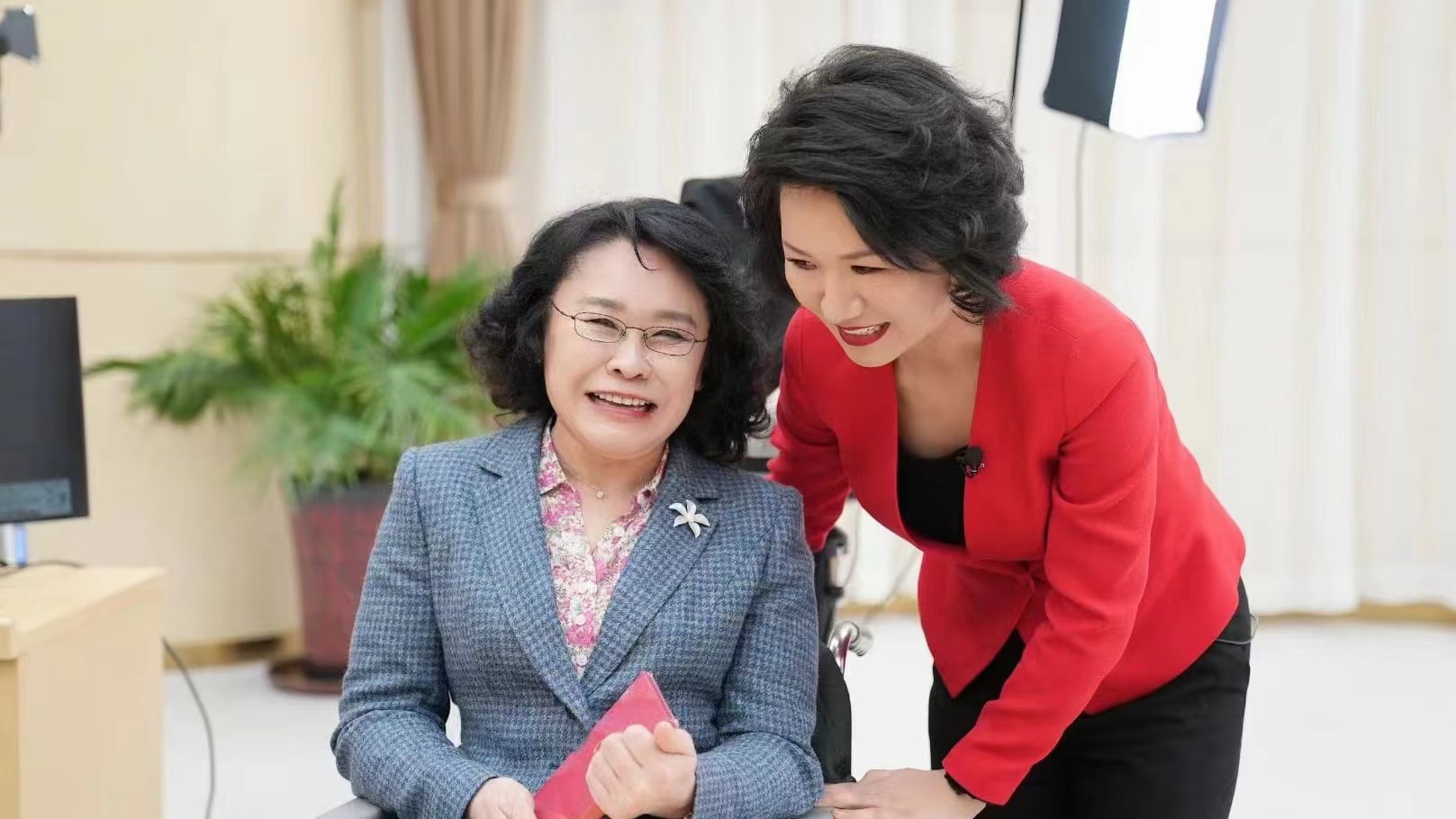
Beijing 2022 Winter Paralympics are a testimony to China's efforts to create an inclusive society. The Games will carry on the legacy of Beijing 2008 Summer Paralympics, boosting winter sports for the differently abled. On the eve of the Winter Games, which opens on March 4, CGTN anchor Liu Xin had an exclusive interview with Zhang Haidi, Chairperson of China's Disabled Persons' Federation, and also a childhood icon for generations of Chinese people who continues to inspire with her passion for life and dedication to social betterment. Here is the full transcript of interview video:

China's journey of bidding, hosting Paralympic Games
Liu Xin: Dear Haidi, thank you so much for accepting our interview. It's always been a dream to meet you in person and today, that dream came true. I want to start by asking you how you felt when China won the bid to host the Winter Paralympic Games the first time in Beijing. It was 2015, July 31. How did you feel?
Zhang Haidi: On July 31, 2015, President Xi Jinping delivered a video address to the International Olympic Committee. On behalf of the Chinese government and people, he expressed our wish to host the 2022 Winter Games.
I clearly remember that in Kuala Lumpur, when Mr. Thomas Bach, President of the IOC, announced that Beijing won the bid to host the 24th Olympic Winter Games in 2022, my colleagues of the Games Bid Delegation and I were so happy that we all shed tears.
As a member of the Bid Delegation, I made a presentation on the Paralympic Winter Games, sharing the positive impact of sports on persons with disabilities, especially the important role of the Beijing 2008 Paralympic Games in promoting the development of the work on disability in China.
I hope to see the most splendid fireworks lighting up the night sky during the opening ceremony of the Beijing 2022 Paralympic Winter Games. My dream will come true soon!
Liu Xin: We're all looking forward to that moment. Talking about the sports development of people with disabilities, China only participated the Paralympic Games in 1984 and in 2002 during the Winter Paralympic Games for the first time. So, how has China's winter sports of people with disabilities been developing over the recent years?
Zhang Haidi: Since 2016, the Chinese Paralympic Sports Delegation has participated in many international winter sports events and won several gold medals.
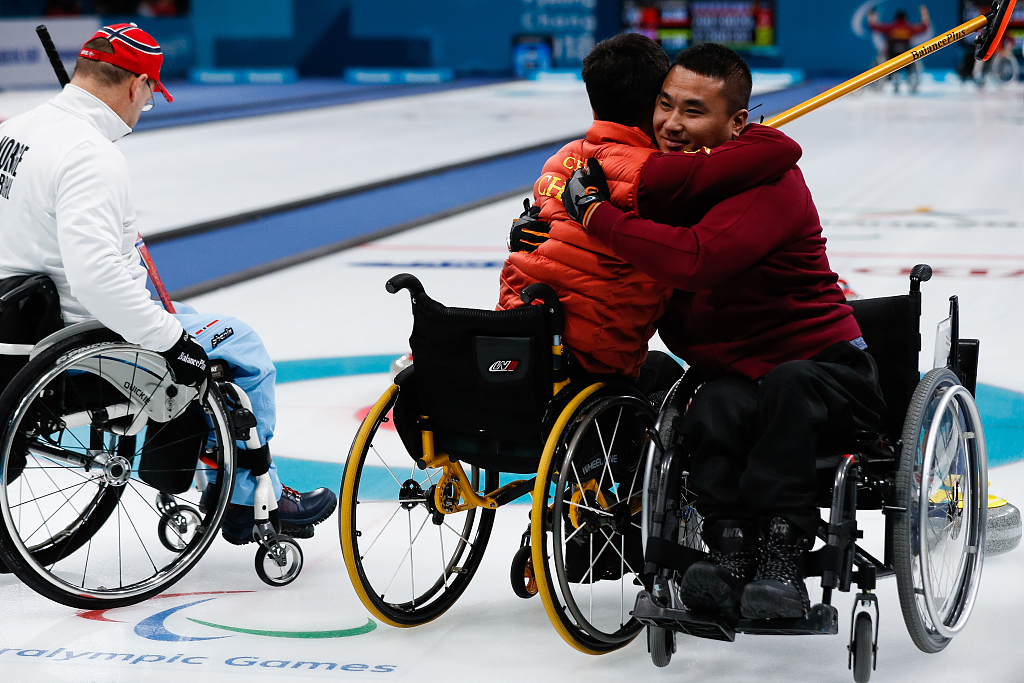
At the PyeongChang Winter Games, the Wheelchair Curling Team won a gold medal, marking the first-ever gold medal, also the first-ever medal in the history of China's participation in the Paralympic Winter Games.
We encourage persons with disabilities to participate in ice and snow sports. China Disabled Persons' Federation (CDPF) has organized five "Ice and Snow Sports Season for Persons with Disabilities".
The past few years have witnessed the continuous progress of China's winter Para sports. The number of the athletes used to be smaller than 50, but now it has grown to over a thousand. The number of events that China participates in has also increased from two to six, covering all major events of the Winter Games.
Liu Xin: It's very impressive. I mean especially this time, Chinese athletes with disabilities will be participating in all events of the Paralympic Winter Games. What is the significance, exactly, of hosting Paralympic Games in China?
Zhang Haidi: The 2022 Winter Games will draw more attention of the whole society to persons with disabilities, promote the development of the work on disability, improve the overall level of Para sports, and encourage more and more persons with disabilities to engage in sports.
In this way, they will be more fit, get better rehabilitation and be more fully included into the society. This Winter Games will also drive more persons with disabilities to join in winter sports, love life, and gain courage.
We hope that the whole society would pay more respect and attention to persons with disabilities and create a more friendly environment.
Liu Xin: Haidi, you are the President of National Paralympic Committee of China. You are the Executive President of Beijing 2022 Organizing Committee. And in days' time, Paralympic Games will start. What kind of preparation has China done, have you put into the Games?
Zhang Haidi: Over the past six years, we have been supporting Beijing Organizing Committee for the 2022 Olympic and Paralympic Winter Games in the Games preparation work. We have also set up a Winter Paralympic Team composed of excellent athletes selected by Disabled Persons' Federations at all levels.
The team takes continuous training throughout the year and participates in international winter sports events. Thus, we build up a competitive team in a short period of time. Our athletes keep training, in spite of hardship and fatigue.
Those for ice sports have to train under low temperature many hours in a row for years. The same for snow sports. Our athletes are so great!
To embrace Beijing 2022 Paralympic Winter Games, we have also built the National Ice Sports Arena for People with Disabilities and many other new accessibility facilities.
China's achievements in protecting the disabled
Liu Xin: It's a lot to look forward to. We definitely share the excitement. Let's talk about attitudes toward people with disabilities in China. There are 85 million people with disabilities in this country. How have the general public's attitude or opinion towards them changed over the past years?
Zhang Haidi: The UN proclaimed 1981 as the International Year of the Disabled. This raised awareness on disability in the whole society. The China Post Office even issued a special stamp themed on this year.
When I came to Beijing in 1984 to attend the founding ceremony of China Welfare Foundation for Disabled Persons, all sorts of feelings welled up when I saw "残疾人"(Disabled Persons), its name.
Until then, persons with disabilities had been called "残废人", literally meaning "disabled and useless people". This small change reflected the renewed attitudes and respect for persons with disabilities of the society.
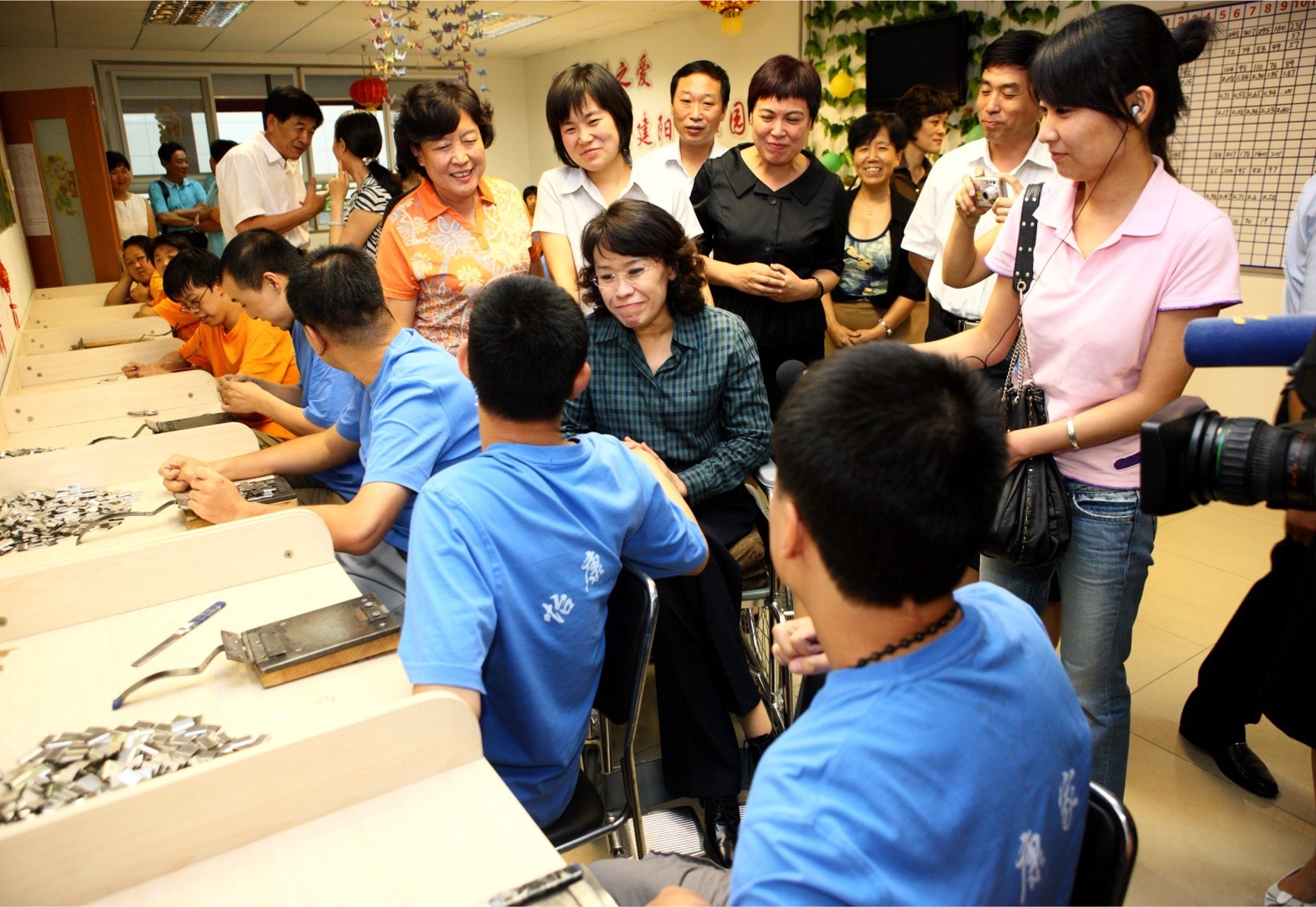
Liu Xin: What are the top priorities in China's protection of their rights and interests?
Zhang Haidi: I've been serving as Chairperson of CDPF for 14 years. During my tenure, I visited many persons with disabilities in many places. It pains me to see what difficulties they are facing, and I clearly feel the weight on my shoulder.
To remove difficulties for persons with disabilities, we need first to know who they are and where they live. Starting from 2015, CDPF has conducted real-name surveys on their basic status and needs for service. Up to now, we have gathered information on over 37 million persons registered with disabilities, and a big data system has been built on this basis to support targeted service.
We facilitated the central government to formulate the policy of living allowances for people in financial difficulties and nursing care subsidies for those with severe disabilities. This policy has benefited more than 26 million people since 2016, which significantly improved their quality of life.
By the end of 2020, more than 7 million people with disabilities have been lifted out of absolute poverty as scheduled. We have directed more efforts to improving nursing care provision, a way to better take care of them and save their families from worries.
For example, in Zhumadian City, Henan Province, there are over 100 care facilities providing care services to more than 2,000 persons with disabilities. For thousands of families with disabled members, the adequate provision of nursing care is the most concrete support.
Liu Xin: What do you think are the most urgent needs of these disabled people?
Zhang Haidi: Rehabilitation, as the key to reshaping one's life, is the most urgent need of persons with disabilities. It is where their hope lies in.
We have facilitated China's enactment of Regulations on Disability Prevention and Rehabilitation, and the delivery of early intervention to meet the urgent needs of infants and children under 6 years old, which gives many children with hearing impairment or cerebral palsy rehabilitation opportunities.
Currently, we are building a national-level university of rehabilitation sciences. The university will be an incubator for top rehabilitation professionals, creating more rehabilitation opportunities for persons with disabilities.
Inclusive education and protecting women's rights
Liu Xin: Let's talk about education. Just now you talked about university. We know that you personally became paralyzed at the age of five, and you never went to school, but you taught yourself.
You even learned four different languages: Japanese, German, English, and Esperanto by yourself. You must think a lot of education, the importance of education. Tell us a little bit about that for people with disabilities.
Zhang Haidi: We have directed active efforts to promoting inclusive education, so that more disabled minors can fit into regular schooling. We have developed facilitation measures for young persons with disabilities to sit for the National College Entrance Examination.
For example, examinees with visual impairment can use large-print or braille test papers, those without arms can bring their own tailor-made desk and chair, and those having cerebral palsy can apply for time extension. In 2020 alone, at least 13,551 of them were enrolled into regular institutions of higher education.
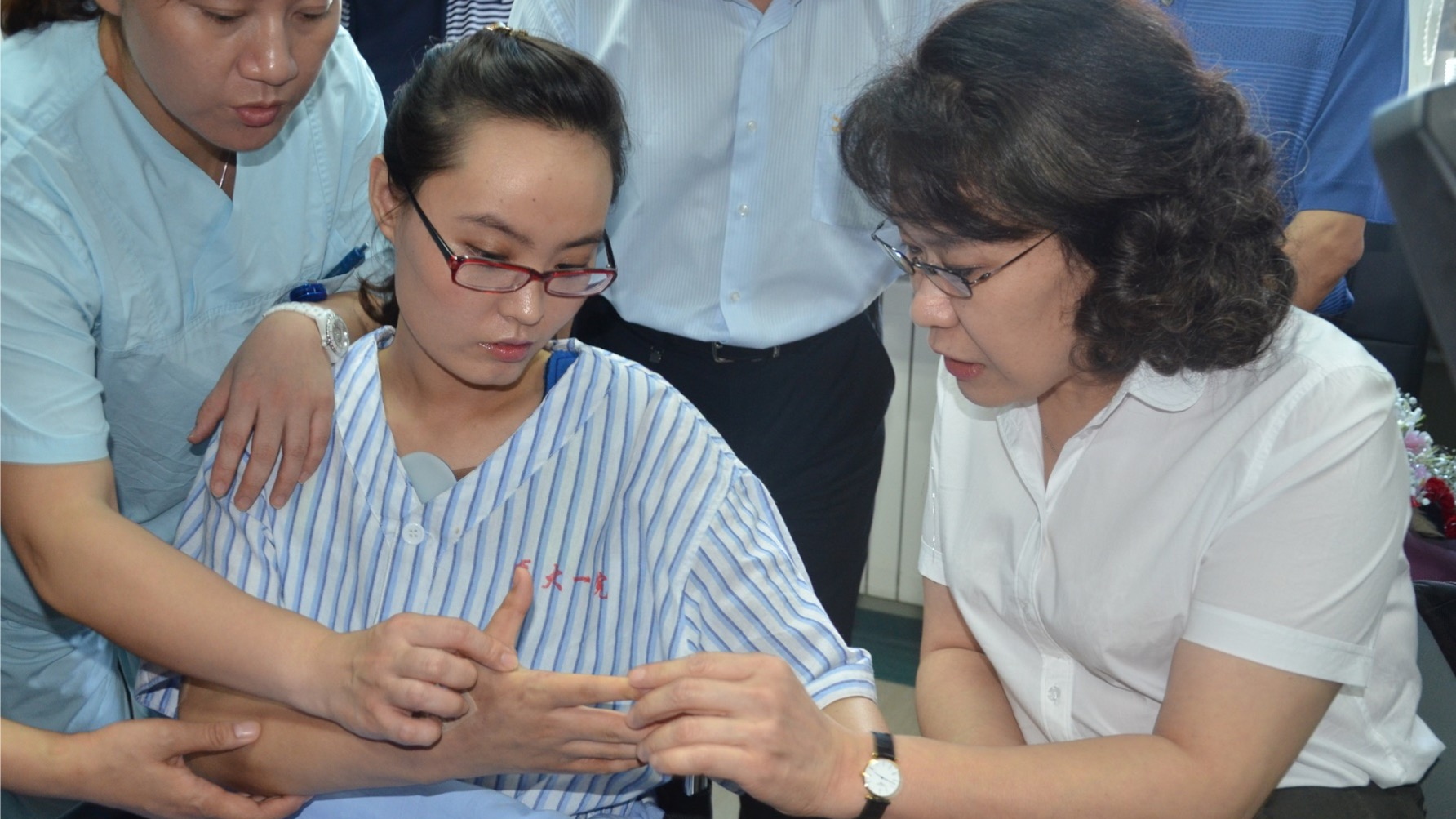
Liu Xin: That's great. That's really great to hear that. Another very important aspect is the development of protection of rights and interests of women with disabilities. What kind of work has gone in there?
Zhang Haidi: In September 2020, to celebrate the 75th anniversary of the United Nations and the 25th anniversary of the fourth World Conference on Women held in Beijing, CDPF, together with UN ESCAP, UN Women and Rehabilitation International, released an initiative titled Call to Action: Enabling Sisters with Disabilities to Join in Shaping the Future We Want.
To support this initiative, I designed a stamp named "Love & Care", the first of its kind in China themed on women with disabilities.

We also hold a "Dialogue with Women with Disabilities", to listen to their needs, and to promote their equal participation in social development.
As a measure to gain them more employment opportunities, I am now working on a project called "Beauty Crafts Workshop", which is supposed to empower them economically, and enhance their confidence in living a decent life.
International cooperation and China's contribution
Liu Xin: We understand that 80% of persons with disabilities actually live in developing countries. So, what do you think are the responsibilities for developing and developed countries in promoting the rights and protection of persons with disabilities? And what kind of work has China done in term of international cooperation for disability?
Zhang Haidi: There are more than one billion persons with disabilities worldwide. They need our support.
Disability is sufferings not only of an individual person, but of the whole humanity. And we have to face it all together.
Improving the well-being of persons with disabilities is the responsibility and direction of efforts shared by all countries in the world.
China is among the earliest countries that called for developing an UN Convention to safeguard the rights and interests of persons with disabilities and is one of the first group of countries to sign the UN Convention on the Rights of Persons with Disabilities.
China also made active efforts in promoting the inclusion of disability issues into the 2030 Sustainable Development Agenda.
CDPF has carried out productive cooperation with UN agencies including ESCAP, WHO, UN Women, UN FPA and UNESCO.
In 2019, Madame Espinosa, President of the 73rd Session of the UN General Assembly and Mr. Bandi, President-elect of the 74th Session successively paid visits to CDPF and spoke highly of the work on disability in China.
Liu Xin: You are also, among all the things you are busy doing, also the President of Rehabilitation International since 2016. Can you help us understand exactly what kind of work this organization does in helping disability and China's contribution to it?
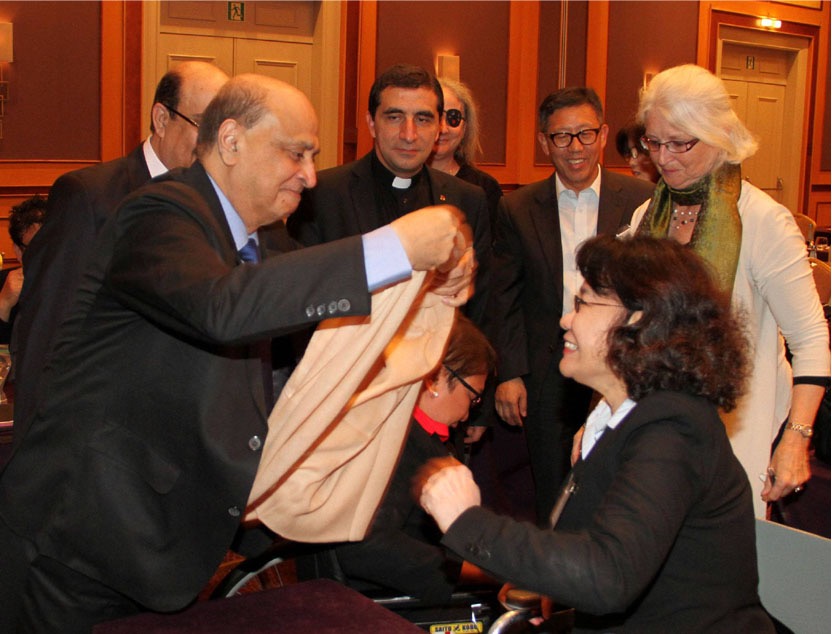
Zhang Haidi: In 2016, I took office as President of Rehabilitation International. Founded in 1922, RI is a century-old non-governmental organization dedicated to promoting the protection of the rights and social integration of persons with disabilities.
The universally adopted Symbol of Access is designed by RI and donated to the international community.
With the donations from the Chinese government, we have set up the RI Global Disability Development Fund and the Africa Fund. Using the two Funds, we have conducted over 30 projects benefiting local persons with disabilities in countries including Russia, Brazil, Ethiopia, South Africa, Lebanon, and Nepal.
In 2019, we conferred, for the first time, the RI Award for Outstanding Achievements with the aim to encourage more people to work for the inclusive development of persons with disabilities. This year marks the 100th anniversary of RI. We will celebrate RI's centenary in Beijing and confer the Award again.
Together for the upcoming Games, together for a shared future!
Liu Xin: Congratulations on that. Finally what kind of message you would like to send to athletes who are going to compete in the Winter Paralympic Games?
Zhang Haidi: Despite our disabilities, please do not hesitate to pursue and create a decent, beautiful life.
The Chinese athletes with disabilities are brave, tenacious, undaunted by challenges and determined to win. The Chinese delegation has ranked first on the gold medal and overall medal charts at five Paralympic Games, wining glory for our life, and showing the strenuous spirits of persons with disabilities as a group.
The Games will end, but life will go on.
I hope that the torch of unremitting self-improvement will continue to burn in the hearts of the athletes. And with such spirits, persons with disabilities will overcome whatever difficulties they meet, and head toward a better future.
I want to say to the athletes from around the world: welcome to China, enjoy Beijing, especially the food, and most importantly, realize your dreams. Together for a shared future!

